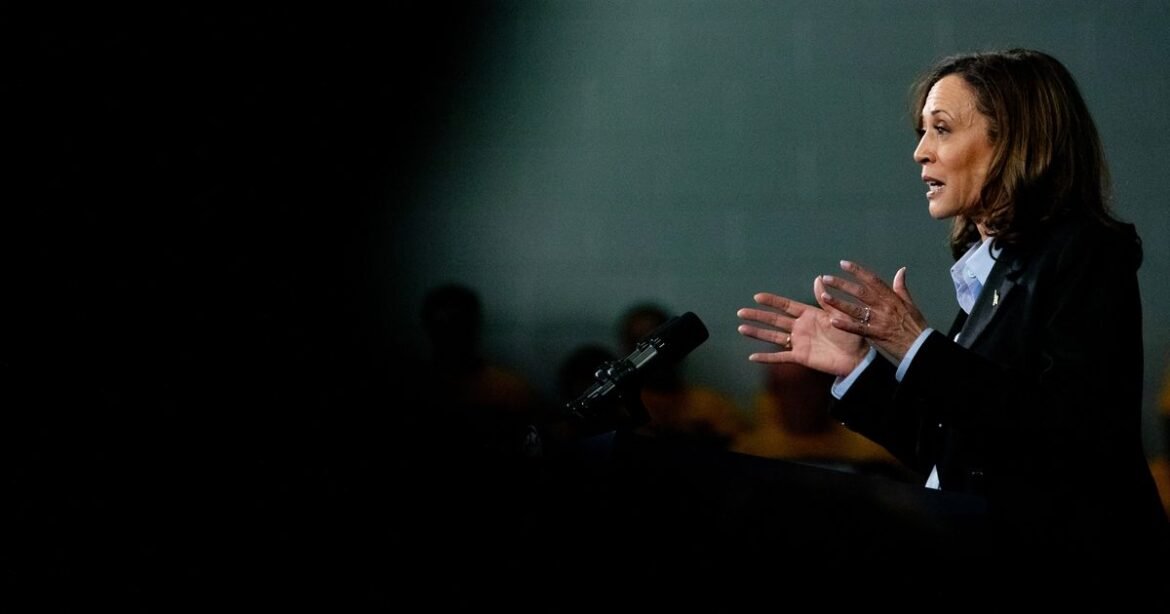
Photo: Emily Elconin/Bloomberg/Getty Images
Kamala Harris’s campaign unveiled its policy platform over the weekend as the vice-president prepares to take on Donald Trump in Tuesday’s high-stakes presidential debate. For weeks, Republicans and pundits alike have knocked Harris as being light on policy since rising to the top of the ticket, a criticism compounded by her initial bare-bones campaign website, which made no mention of her stances.
In a list headed “A New Way Forward,” the campaign has divided its issues into various areas of focus, including the economy, foreign policy, and protecting “fundamental freedoms,” which include abortion rights and civil rights. Each policy area features a section on Project 2025, contrasting the Harris-Walz stance against the Heritage Foundation–backed plan Trump has attempted to disavow. As the campaign pledges to move toward a new era of politics, some ties to the Biden campaign appear harder to shake. In addition to including some of the same positions Harris held as vice-president, The New Republic reports, the policy page initially contained metadata that referenced reelecting Joe Biden, suggesting some of the text was taken directly from the old campaign website. (The references have since been removed.) Here are some highlights of Harris’s proposals.
Under her economic policy, Harris calls for the end of “subminimum wages for tipped workers and people with disabilities” in what appears to be a new proposal. Under federal law, employers have to pay their tipped workers only $2.13 per hour as long as that amount plus tips equals the current federal minimum wage of $7.25. The vice-president is also calling for raising that minimum, though she did not specify a figure. And she wants to eliminate taxes on tips, which Trump has also proposed and which economists are less enthusiastic about.
In Harris’s plan to address housing scarcity, she is pushing for the construction of 3 million rental units and homes in her first term as president. She’s also promising to “provide first-time homebuyers with up to $25,000 to help with their down payments, with more generous support for first-generation homeowners,” per the campaign’s website. Experts have raised questions about the feasibility of some of these proposals, with one economist telling the Times that the new homebuyers’ assistance could result in steeper competition for an already limited supply of housing.
Harris has made tackling high costs a key part of her economic policies in an attempt to take on inflation, which is consistently near the top of voters’ concerns. As part of her new platform, she’s backing a ban on corporate price gouging on food and groceries as well as on price-fixing by corporate landlords, which she says contributes to excessive expenses for the average consumer and renter. Harris first raised these messages during an economic address in Raleigh, North Carolina, in her first policy speech since becoming the nominee. Trump has sought to tie Harris to rising costs, pointing to the current administration and “Bidenomics” as the reason for Americans’ heftier bills. Though Harris hasn’t specified what her proposed price-gouging ban will entail, the former president has claimed it will amount to “SOVIET Style Price Controls.”
On health-care costs, the vice-president is also promising to expand the $2,000 cap on out-of-pocket spending, as well as the $35 cap on insulin, from seniors to all Americans.
Harris indicated support for “commonsense” Supreme Court reforms in order to address the body’s waning support from the American people. Specifically, her campaign noted, she backs “requiring Justices to comply with ethics rules that other federal judges are bound by and imposing term limits.”
Not mentioned is the popular progressive position of increasing the number of justices on the Supreme Court, also known as Court-packing, which Harris previously expressed an openness toward during her 2020 presidential bid. She later avoided questions on the subject during a vice-presidential debate with Mike Pence.
A significant portion of the Harris-Walz platform revolves around the legislation Harris has vowed to pass into law if elected president. Among these are the PRO Act, which expands labor protections, as well as the Public Service Freedom to Negotiate Act, which protects the right of public-sector employees to organize and join a union. She’s also promising to sign bills codifying Roe v. Wade and banning assault rifles.
Harris is also vowing to sign the bipartisan border bill that failed to pass in Congress earlier this year after Republicans came out in droves to oppose it. In her platform, the campaign highlighted the legislation’s funding of detection technology to stop drug trafficking as well as its addition of more border agents, a sign of how the Democratic Party is attempting to adapt to the raging debate on immigration happening among the American electorate.
However, these promises hinge on the Democratic Party’s ability to retain and gain seats in both chambers of Congress in November, a scenario that’s far from a given in this close and contentious election cycle.

